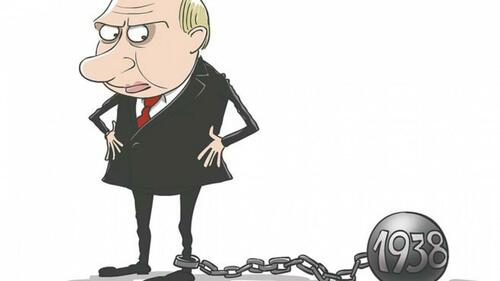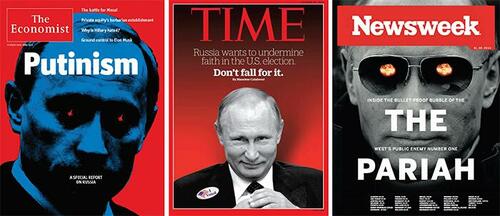
Amid the recent days of stepped-up major Russian attacks on Ukraine's energy infrastructure, which the Kremlin on Thursday said is necessary in response to Ukrainian forces' own cross-border attacks on Russian oil refineries, the rhetoric out of Europe is becoming unhinged.
In but the latest example of this, German Defense Minister Boris Pistorius has compared Putin and his war in Ukraine to Nazi leader Adolf Hitler’s annexation of Czechoslovak territory in 1938.

Pistorius echoed the assumption that Putin is waging an expansionist war and seeks to take more territory even beyond Ukraine, which remains unfounded and with zero evidence. Still, the defense chief urged Europe to prepare for large-scale Russian attack.
"Putin will not stop once the war against Ukraine is over," Pistorius said late Wednesday. Somewhat ironically, the provocative comments were issued at an event unveiling a new biography of Britain’s wartime leader Winston Churchill.
"He has also said that clearly," Pistorius continued. "Just as clearly as Hitler, who also always said that he would not stop."
"We have to put this country back in a position where it can defend itself," Pistorius said at the book event, as cited in Bloomberg. "We have to decide now whether we want to prepare for a genuine threat from Putin to materialize or whether we want to make it easy for him."
In February, Pistorius announced that Germany might seek to increase defense spending by as much 3.5% of economic output, though he also conceded that finding the funds would be tough.
NATO officials and connected think tanks have long assumed that Putin seeks to erect a new Russian 'empire' - given that in a number of speeches he's made positive references to Czar Peter the Great while speaking of "returning historically Russian lands."
But so far at least, there have been no actions of the Russian military directly threatening other states outside Ukraine. Recently Moldova has been a big concern of Western planners, with some reports claiming that the Kremlin is seeking to destabilize the small former Soviet republic which neighbors Ukraine and Romania.
Not so original: the whole 'Putler' trend and Hitler comparison has been a worn-out talking point of Western officials and media headlines going back years...
Putin is an illegitimate President who is afraid of real elections because he is afraid of his people.
— Rasa Juknevičienė (@RJukneviciene) April 10, 2024
To defeat him, bring victory to Ukraine, and freedom to the Russian people we need a bold coalition, similar to the one Allies created to defeat Hitler. @EPPGroup pic.twitter.com/Mg9d8zEkhX
In light of this latest "Putin is Hitler!" commentary out of Germany's defense minister, the below essay entitled Don’t Depict Putin, Kim, Assad And Others As Cartoon Villains by Mila Ghorayeb at The Maple is worth revisiting...
* * *
Despite knowing better, people’s conception of a government or even an entire country often rests on the image of its leader. People thinking of the Canadian government, for example, now fixate on Prime Minister Justin Trudeau. Americans fixate on leaders as well, often using terms like “Trump’s America” to tie the climate of social relations to their president. The head of state becomes the state itself.
But it goes even further with countries that the governments of the United States and Canada are unfriendly with. In these cases, mainstream media, pop culture and politicians speak of their leaders not only like they are the country, but as though they’re cartoon villains.
Former Libyan leader Muammar Gaddafi, famously called the “mad dog of the Middle East” by then U.S. President Ronald Reagan, had a documentary released about him post-mortem by the same name. Syrian President Bashar al-Assad is a “butcher” gone wild who supposedly unleashed chemical weapons on an area his government had nearly retaken just because he’s full of bloodlust. Magazines are riddled with covers depicting leaders, such as Russian President Vladimir Putin, as people that simply want to watch the world burn.
As a result, those involved in political discourse lose sight of basic international relations analysis. These leaders aren’t treated as rational actors that, in turn with other members of their government, act based on strategy. They are portrayed as being motivated merely by destruction.
Part of the reason for this is that some think “rational” has a positive value judgment attached to it. That is, if we acknowledge behaviour as motivated by a strategic rationale, we’re excusing it. But it also fits into a long line of colonial tropes, reminiscent of standards of civilization posited by European colonialists: the Global South is chaotic and uncivilized, giving Europeans entitlement to colonize these areas for their own good.
Today, the media portrays the good hegemons as democratic actors that solve their problems with level-headed strategy. Their enemies, meanwhile, are portrayed as erratic, hostile and rogue figures that will unexpectedly unleash violence simply because they can. As such, they can be portrayed as animals that need to be “tamed” or put down.
None of this is to say that these leaders are good. You’d be hard-pressed to find politicians that have not (albeit in varying degrees) done gravely immoral things. But we should care about our ability to point out that these leaders aren’t just acting to cause chaos, because politics and journalism should be concerned with the truth. We need to confront things as they really are.
Unfortunately, many conversations about foreign policy don’t discuss anything real at all, instead becoming theatrical gestures of moral grandstanding: There’s a villain that needs to be slain in order to fix a country’s problems, and that’s that. One of the reasons for this is to conceal who are really the victims of war and sanctions. Few Canadians would enthusiastically support sanctions against Iran or Syria, for example, if they knew they’d deeply deprive ordinary citizens of basic needs. As a result, sanctions are portrayed as targeting someone cartoonishly evil enough that the visceral response is to want to put them down with whatever method the state department insists will work.
For example, a Gallant Foundation study, reported on by the Yale Review of International Studies (YRIS) in 2018, found that U.S. print media compared Iraqi President Saddam Hussein to Adolf Hitler at least 1,035 times between August 1990 and February 1991, the period leading up to the Gulf War and through to its end. YRIS notes that the media narrative portrayed then-U.S. President George Bush as a brave hero confronting a “monster,” “beast” and “madman,” garnering American support for their government to attempt to remove Hussein from power.
North Korea is another case where cartoonishness is not only frequent, but the standard of reporting. Major outlets make baseless, often contradictory, claims, such as that all students in the country are required to get the same haircut as Kim Jong Un, or that no one is allowed to. These claims inevitably get debunked, yet leave the lasting impression that Kim is keeping an entire population subjugated not for any rational political motive, but to satiate absurd and borderline insane whims.
Of course, this kind of reporting is intended to do more than just entertain. If Kim is an unhinged monster that can’t be reasoned with, approaching North Korea with the utmost amount of aggression becomes justified. It makes Kim seem like a ticking time bomb that needs to be urgently confronted rather than diplomatically addressed. These efforts have worked, as an alarming amount of Americans, for instance, support a nuclear strike that would kill a large chunk of North Korean civilians.
This narrative has also created widespread worry about Kim having access to nuclear weapons, with American leaders and analysts publishing doom fantasies of an impending nuclear war. Some of this analysis will admit that Kim isn’t an irrational participant, but then still rests on a conception of him as a man with an unsatiated God-complex ruling over brainwashed individuals.
However, North Korea in recent history watched as Libya gave up its nuclear program only to have its government be overthrown shortly after, with Gaddafi being brutally sodomized and then murdered. North Korea saw and learned from this. As such, their nuclear program is a deterrent action by a rational state. This doesn’t make it a good government, but just means it’s capable of understanding state relations and making judgement calls for survival.
Further, mainstream media, pop culture and politicians need to stop oversimplifying the relationship between leaders our governments dislike and the citizens of their countries. The Communist Party of China, for instance, enjoys relatively high levels of support. Instead of careful reflection about what kind of policies make the party popular, along with other informative political metrics, it’s common to simply dismiss the Chinese population’s support for their government as a product of mass brainwashing. It’s hard for the media and onlookers to admit that the governments they demonize can simply enjoy popular support in a way that isn’t the result of a conspiracy.
Syria is another such case, where popular support for its oft-demonized leader is swept under the rug. To attempt to understand this support is met with accusations of apologism for Assad’s government. But there are factors relevant to Assad’s level of support that don’t revolve around his personality: the prevalence of terrorism, the potential ‘rally around the flag’ effect he may enjoy in the context of a war or the lack of a multi-sect opposition.
Admitting there are complex relationships between leaders and their population helps us ensure that we’re talking about something real in our political discourse.
I bring this up not because we need to praise or rehabilitate the personalities of world leaders. The intent is, rather, to point out that we place far too much emphasis on their personalities to begin with rather than the incentive structures that they, or their supporters, may be responding to. The solution is to instead strategically approach these incentive structures.
To be sure, the personalities of these individuals will play a role in their interactions with other leaders, but to make them the centrepiece is to obscure the conversation. We need to be able to talk about state behaviour and interactions without resorting to caricature, speculation and outright falsehoods.
To try and demystify what’s happening and wade through media sensationalism is not to exalt the media’s, or government’s, target. Rather, it’s an attempt to see things as they really are so that we can think for ourselves and come to organic conclusions.
Amid the recent days of stepped-up major Russian attacks on Ukraine’s energy infrastructure, which the Kremlin on Thursday said is necessary in response to Ukrainian forces’ own cross-border attacks on Russian oil refineries, the rhetoric out of Europe is becoming unhinged.
In but the latest example of this, German Defense Minister Boris Pistorius has compared Putin and his war in Ukraine to Nazi leader Adolf Hitler’s annexation of Czechoslovak territory in 1938.

Pistorius echoed the assumption that Putin is waging an expansionist war and seeks to take more territory even beyond Ukraine, which remains unfounded and with zero evidence. Still, the defense chief urged Europe to prepare for large-scale Russian attack.
“Putin will not stop once the war against Ukraine is over,” Pistorius said late Wednesday. Somewhat ironically, the provocative comments were issued at an event unveiling a new biography of Britain’s wartime leader Winston Churchill.
“He has also said that clearly,” Pistorius continued. “Just as clearly as Hitler, who also always said that he would not stop.”
“We have to put this country back in a position where it can defend itself,” Pistorius said at the book event, as cited in Bloomberg. “We have to decide now whether we want to prepare for a genuine threat from Putin to materialize or whether we want to make it easy for him.”
In February, Pistorius announced that Germany might seek to increase defense spending by as much 3.5% of economic output, though he also conceded that finding the funds would be tough.
NATO officials and connected think tanks have long assumed that Putin seeks to erect a new Russian ’empire’ – given that in a number of speeches he’s made positive references to Czar Peter the Great while speaking of “returning historically Russian lands.”
But so far at least, there have been no actions of the Russian military directly threatening other states outside Ukraine. Recently Moldova has been a big concern of Western planners, with some reports claiming that the Kremlin is seeking to destabilize the small former Soviet republic which neighbors Ukraine and Romania.
Not so original: the whole ‘Putler’ trend and Hitler comparison has been a worn-out talking point of Western officials and media headlines going back years…
Putin is an illegitimate President who is afraid of real elections because he is afraid of his people.
To defeat him, bring victory to Ukraine, and freedom to the Russian people we need a bold coalition, similar to the one Allies created to defeat Hitler. @EPPGroup pic.twitter.com/Mg9d8zEkhX
— Rasa Juknevičienė (@RJukneviciene) April 10, 2024
In light of this latest “Putin is Hitler!” commentary out of Germany’s defense minister, the below essay entitled Don’t Depict Putin, Kim, Assad And Others As Cartoon Villains by Mila Ghorayeb at The Maple is worth revisiting…
* * *
Despite knowing better, people’s conception of a government or even an entire country often rests on the image of its leader. People thinking of the Canadian government, for example, now fixate on Prime Minister Justin Trudeau. Americans fixate on leaders as well, often using terms like “Trump’s America” to tie the climate of social relations to their president. The head of state becomes the state itself.
But it goes even further with countries that the governments of the United States and Canada are unfriendly with. In these cases, mainstream media, pop culture and politicians speak of their leaders not only like they are the country, but as though they’re cartoon villains.
Former Libyan leader Muammar Gaddafi, famously called the “mad dog of the Middle East” by then U.S. President Ronald Reagan, had a documentary released about him post-mortem by the same name. Syrian President Bashar al-Assad is a “butcher” gone wild who supposedly unleashed chemical weapons on an area his government had nearly retaken just because he’s full of bloodlust. Magazines are riddled with covers depicting leaders, such as Russian President Vladimir Putin, as people that simply want to watch the world burn.
As a result, those involved in political discourse lose sight of basic international relations analysis. These leaders aren’t treated as rational actors that, in turn with other members of their government, act based on strategy. They are portrayed as being motivated merely by destruction.
Part of the reason for this is that some think “rational” has a positive value judgment attached to it. That is, if we acknowledge behaviour as motivated by a strategic rationale, we’re excusing it. But it also fits into a long line of colonial tropes, reminiscent of standards of civilization posited by European colonialists: the Global South is chaotic and uncivilized, giving Europeans entitlement to colonize these areas for their own good.
Today, the media portrays the good hegemons as democratic actors that solve their problems with level-headed strategy. Their enemies, meanwhile, are portrayed as erratic, hostile and rogue figures that will unexpectedly unleash violence simply because they can. As such, they can be portrayed as animals that need to be “tamed” or put down.
None of this is to say that these leaders are good. You’d be hard-pressed to find politicians that have not (albeit in varying degrees) done gravely immoral things. But we should care about our ability to point out that these leaders aren’t just acting to cause chaos, because politics and journalism should be concerned with the truth. We need to confront things as they really are.
Unfortunately, many conversations about foreign policy don’t discuss anything real at all, instead becoming theatrical gestures of moral grandstanding: There’s a villain that needs to be slain in order to fix a country’s problems, and that’s that. One of the reasons for this is to conceal who are really the victims of war and sanctions. Few Canadians would enthusiastically support sanctions against Iran or Syria, for example, if they knew they’d deeply deprive ordinary citizens of basic needs. As a result, sanctions are portrayed as targeting someone cartoonishly evil enough that the visceral response is to want to put them down with whatever method the state department insists will work.
For example, a Gallant Foundation study, reported on by the Yale Review of International Studies (YRIS) in 2018, found that U.S. print media compared Iraqi President Saddam Hussein to Adolf Hitler at least 1,035 times between August 1990 and February 1991, the period leading up to the Gulf War and through to its end. YRIS notes that the media narrative portrayed then-U.S. President George Bush as a brave hero confronting a “monster,” “beast” and “madman,” garnering American support for their government to attempt to remove Hussein from power.
North Korea is another case where cartoonishness is not only frequent, but the standard of reporting. Major outlets make baseless, often contradictory, claims, such as that all students in the country are required to get the same haircut as Kim Jong Un, or that no one is allowed to. These claims inevitably get debunked, yet leave the lasting impression that Kim is keeping an entire population subjugated not for any rational political motive, but to satiate absurd and borderline insane whims.
Of course, this kind of reporting is intended to do more than just entertain. If Kim is an unhinged monster that can’t be reasoned with, approaching North Korea with the utmost amount of aggression becomes justified. It makes Kim seem like a ticking time bomb that needs to be urgently confronted rather than diplomatically addressed. These efforts have worked, as an alarming amount of Americans, for instance, support a nuclear strike that would kill a large chunk of North Korean civilians.
This narrative has also created widespread worry about Kim having access to nuclear weapons, with American leaders and analysts publishing doom fantasies of an impending nuclear war. Some of this analysis will admit that Kim isn’t an irrational participant, but then still rests on a conception of him as a man with an unsatiated God-complex ruling over brainwashed individuals.
However, North Korea in recent history watched as Libya gave up its nuclear program only to have its government be overthrown shortly after, with Gaddafi being brutally sodomized and then murdered. North Korea saw and learned from this. As such, their nuclear program is a deterrent action by a rational state. This doesn’t make it a good government, but just means it’s capable of understanding state relations and making judgement calls for survival.
Further, mainstream media, pop culture and politicians need to stop oversimplifying the relationship between leaders our governments dislike and the citizens of their countries. The Communist Party of China, for instance, enjoys relatively high levels of support. Instead of careful reflection about what kind of policies make the party popular, along with other informative political metrics, it’s common to simply dismiss the Chinese population’s support for their government as a product of mass brainwashing. It’s hard for the media and onlookers to admit that the governments they demonize can simply enjoy popular support in a way that isn’t the result of a conspiracy.
Syria is another such case, where popular support for its oft-demonized leader is swept under the rug. To attempt to understand this support is met with accusations of apologism for Assad’s government. But there are factors relevant to Assad’s level of support that don’t revolve around his personality: the prevalence of terrorism, the potential ‘rally around the flag’ effect he may enjoy in the context of a war or the lack of a multi-sect opposition.
Admitting there are complex relationships between leaders and their population helps us ensure that we’re talking about something real in our political discourse.
I bring this up not because we need to praise or rehabilitate the personalities of world leaders. The intent is, rather, to point out that we place far too much emphasis on their personalities to begin with rather than the incentive structures that they, or their supporters, may be responding to. The solution is to instead strategically approach these incentive structures.
To be sure, the personalities of these individuals will play a role in their interactions with other leaders, but to make them the centrepiece is to obscure the conversation. We need to be able to talk about state behaviour and interactions without resorting to caricature, speculation and outright falsehoods.
To try and demystify what’s happening and wade through media sensationalism is not to exalt the media’s, or government’s, target. Rather, it’s an attempt to see things as they really are so that we can think for ourselves and come to organic conclusions.
Loading…






